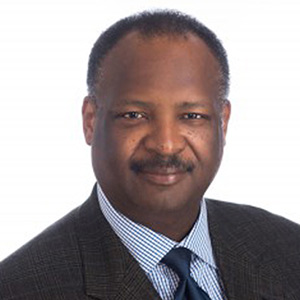Robert Mallett
 Robert Mallett grew up in Houston, Texas one of five children surrounded by a large extended family. His parents, a steel worker and homemaker, grounded their children with a strong sense of self and showed them how to live productive and useful lives. They taught Robert and his siblings good manners, the importance of thriftiness, and the value of hard work.
Robert Mallett grew up in Houston, Texas one of five children surrounded by a large extended family. His parents, a steel worker and homemaker, grounded their children with a strong sense of self and showed them how to live productive and useful lives. They taught Robert and his siblings good manners, the importance of thriftiness, and the value of hard work.
Robert earned an undergraduate degree from Morehouse College where he was a Charles E. Merrill Overseas Scholar his junior year. After graduation he continued his education at Harvard Law School. In the summer between college and law school, he earned spending money as a baggage handler for Delta Airlines. Growing up, Robert mowed yards and did other sweat-inducing jobs, but being a baggage handler took hard work to a new level. While Robert had met and known many working class men and women growing up, he had never been their colleague in the way he was at Delta. While the job frequently required more brawn than brains, Robert says the lessons he learned that summer could fill a book.
After graduating from law school in 1982, Robert first clerked for a federal appellate court judge and then joined the Washington, D.C. office of New York law firm Kaye, Scholer. This paved the way to an appointment as senior legislative counsel to Senator Lloyd Bentsen. Following an exciting four years on Capitol Hill, Robert served as Washington’s City Administrator and Deputy Mayor of Operations. Robert says this was the hardest job he ever held because the demands of the position were relentless, exacerbated by the financial austerity during his tenure. Even so, managing in local government taught him organizational behavior, the importance of goal-setting and measurement, motivational techniques, financial statement analysis, the value of communications and messaging, and a litany of other skills that serve him well to this day.
During the Clinton Administration, Robert served as Deputy Secretary and later as Acting Secretary at the U.S. Commerce Department. While at Commerce, Robert seized opportunities to advocate for American businesses abroad. After a stint as a Visiting Professor at Harvard, Robert went on to become a Senior Vice President and Corporate Officer at Pfizer where he also served as President of the Pfizer Foundation. During this period, Pfizer was instrumental in founding the Infectious Diseases Institute in Uganda, a scientific and medical center of excellence in Africa that is now self-sustaining. Working to help improve the lives of the African people was the main catalyst for his current role as President and CEO of Africare, a leading non-governmental organization committed to addressing African development by working in partnership with African people to build sustainable, healthy, and productive communities.
Currently in the second year at the helm of Africare, Robert believes his priorities are clear: strengthen development and raise money, focus on management and increase operational excellence, and develop and improve Africare’s workforce in the United States and Africa. Africare’s programs include some of the most innovative work in development today, especially in the areas of nutrition, food security, and maternal and child health. Partnering with ExxonMobil and the National Basketball Association (NBA), Africare is now in the second year of the Power Forward program using basketball to develop health literacy and life skills among Nigerian youth.
Throughout the years, Robert has spent substantial time behind the scenes nurturing young talent. A special source of pride for him is the large number of former staff members and mentees he worked with along the way that are still in touch with him, eager to share their successes. Robert has also lent his expertise to numerous nonprofits, working to support their key missions locally, nationally, and globally.
In his free time, Robert enjoys fine food, wine, and art. He balances his epicurean tendencies with four days a week in the gym, although he admits his love of food and wine often seems to take priority. He frequents galleries and museums during his travels and has a broad and eclectic art collection. He is a patron to a few young African American artists whose work he particularly admires.
Q&A
- How did you get your name?
I am named after a favorite uncle. He and my aunt were devoted to me as a child. They’ve long since passed on, but I think of them almost every day. - What did you want to be when you grew up?
I wanted to be whatever my brother decided he wanted to be. I thought he was the best brother in the world. I really admired him, still do. - What do you want to be now?
I would like to be a philanthropist, and “oh, the things I would do!” - If you could have a mulligan, what would you redo?
I would have learned how to swim as a child. Through a variety of circumstances, I did not learn as a child, and though I have taken lessons as an adult they never took. When I was eight years old during one summer swimming lesson with an impatient teacher, had I jumped into the deep water when directed, and not into the shallow pool, my fear of deep water might have been conquered. - What are you reading currently?
The Rains: Voices of American Liberty by Sulayman Clark and We Should All Be Feminists by Chimamanda Ngozi Adichie. I have a Kindle and have read a few books on it, but I find that I like the feel of a book in hand, with dog-earing pages and writing in the margins. - If you couldn’t live in America, where would you establish your home?
I think Botswana, a small country in southern Africa that’s about the size of Texas, my home state, but with far fewer people, a well-earned reputation for model democratic and clean governance. It’s peaceful, beautiful, is home to fascinating wildlife, and just seems like an easy place to live. - What is the biggest challenge ahead of you?
Growing Africare - Which living person do you most admire?
President Jimmy Carter - What is your greatest extravagance?
Art and wine. I have been an art collector for several decades now. I purchased my first piece of original art when I was a sophomore in college. I still have it. Since then, I’ve ramped it up a bit. I could not live easily without being surrounded by such beauty and creativity on the walls of my home and office. I became a wine collector about a dozen years ago, and I am pretty happy that wine menus in restaurants no longer intimidate me. I have been known to choose and serve a fine bottle or two. - Which superpower would you most like to have?
Invisibility - You’re invited to a state dinner at the White House and cannot take your spouse/significant other? Who is your date?
My mother, an 85-year old woman who pinches herself that her son has met presidents and has dined in the White House. Nothing in her world prepared her (or me) for such a thing. I would proudly walk into that house with my mother on my arm and introduce her to the President of the United States, hoping that she would not embarrass us both and faint. - Assuming you had the talent, with what musical group/artist living or dead would you most like to perform?
It’s pretty eclectic, and I am hard-pressed to choose just one, so here’s my list: Amongst the dead, Michael Jackson, Dinah Washington, and Pavarotti; Amongst the living, Garth Brooks, Aretha Franklin, and Earth, Wind & Fire.
